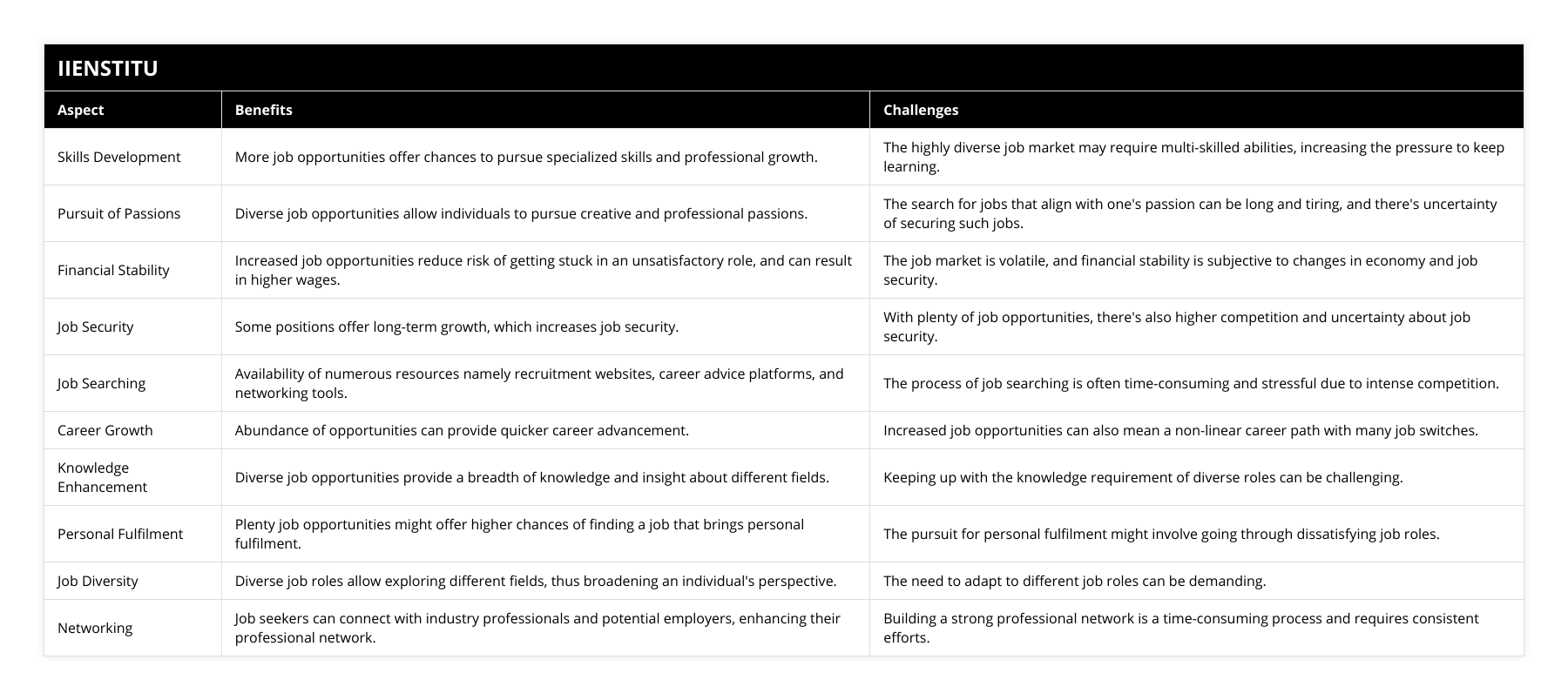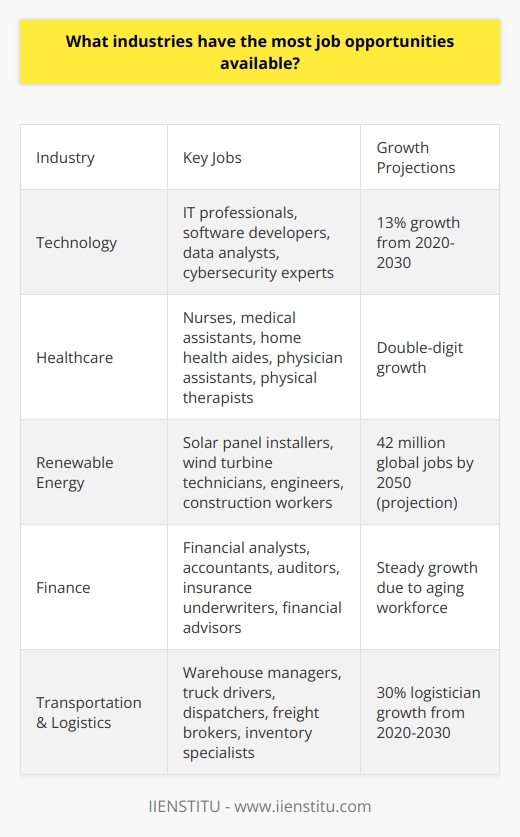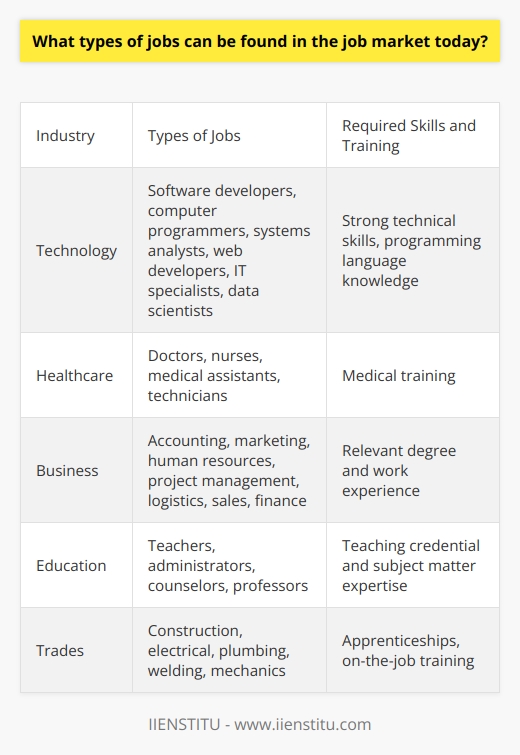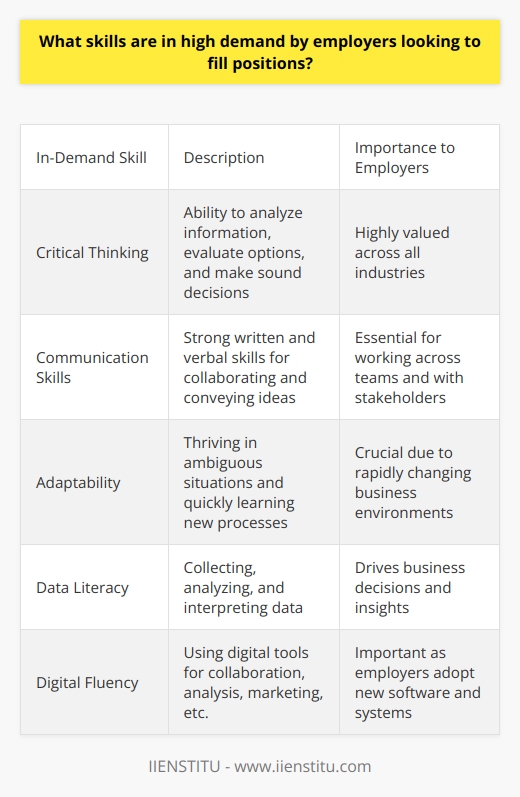
I still remember the day I graduated from college, clutching my diploma tightly, full of hopes and fears about stepping into the "real world." The possibilities seemed endless, yet overwhelming. Back then, finding a job felt like searching for a needle in a haystack. But nowadays, with the rapid growth of technology and the ever-expanding global marketplace, the landscape of job opportunities has transformed dramatically.
Benefits of Job Opportunities
Challenges of Job Opportunities
Strategies for Exploring Job Opportunities
The modern job market is both a blessing and a challenge. On one hand, we've got an abundance of openings, especially with the rise of online jobs and remote work. On the other hand, the sheer volume of options can leave us feeling a bit like a deer in headlights. How do we navigate this vast terrain? How do we seize the right opportunities that not only pay the bills but also nourish our passions and aspirations?
Let's take a closer look at the benefits and challenges of today's job opportunities and explore strategies to make the most out of them.
Embracing the Benefits of Abundant Job Opportunities
Access to Diverse Skill Development
One of the most exciting perks of the current job market is the access to an array of roles that allow us to develop specialized skills. Remember when jobs were limited to traditional professions? Well, that's no longer the case. Today, we can dive into fields like digital marketing, data analysis, or even become influencers on social media platforms. The sky's the limit!
For instance, my cousin Sarah, who studied literature, found her niche in content strategy for a tech startup. She combined her love for words with the dynamic world of technology. Not only did she hone her writing skills, but she also learned about SEO, user engagement, and analytics. Now, she's a sought-after professional in her field.
Moreover, the more we learn, the more doors open. By acquiring new competencies, we increase our marketability. Employers are on the lookout for individuals who bring multifaceted skills to the table. It's a hustle, but it's also an opportunity to grow and adapt.
Pursuing Creative and Professional Passions
Have you ever dreamed of turning your hobby into a career? Well, now's a better time than ever to do just that! The proliferation of job opportunities means we can align our work with our passions. Whether it's graphic design, culinary arts, or even game development, there are positions out there waiting for us.
Take the example of online platforms that connect freelancers with clients globally. Websites like Upwork and Fiverr have enabled countless people to monetize their talents. This shift has also made it easier for job search enthusiasts to find roles that genuinely excite them, rather than settling for whatever comes their way.
Improved Financial Stability
Let's not forget the financial perks. With more jobs available, particularly in lucrative fields like information technology (IT) and human resources jobs, we have a better shot at securing positions that offer competitive salaries and benefits.
When I was job searching after college, I stumbled upon a job posting for an entry-level position in supply chain management. Initially, I hesitated because it wasn't my field of study. But after researching, I discovered that optimizing the supply chain management process could be a golden opportunity. Learning how to optimize supply chain management process tips made me realize it's a critical and high-demand skill in today's market. I decided to give it a shot, and it turned out to be a financially rewarding decision.
Higher wages and better benefits packages contribute to long-term financial planning, allowing us to save, invest, and prepare for the future with confidence.
Facing the Challenges Head-On
Intense Competition
However, it's not all sunshine and rainbows. The flip side of abundant job opportunities is intense competition. With more people vying for the same positions, standing out becomes crucial. I've noticed that job applications now require not just a resume and cover letter but also portfolios, video introductions, and sometimes even project proposals.
This level of competition means we need to continuously upskill and stay abreast of industry trends. It's a hustle, but it's also an opportunity to grow and adapt. We must be proactive in enhancing our profiles to catch the eye of recruiters.
Stress and Uncertainty
The job search process can be stressful, no doubt about it. The uncertainty of waiting for responses, the possibility of rejection, and the pressure to perform can take a toll on our mental health.
When my friend James was laid off due to company downsizing, he found himself in a tough spot. The job search job search became a source of anxiety for him, especially with bills piling up. He began doubting his abilities and felt overwhelmed by the competitive market.
Opportunity is abundant even if you have to create it yourself

But James didn't give up. He:
Reached out for support from friends and family.
Attended networking events to expand his connections.
Consulted with a career advisor for guidance.
Eventually, he landed a role that was an even better fit than his previous job. Every "no" brings us closer to a "yes."
Job Security Concerns
In today's fast-paced world, job security isn't always guaranteed. Companies evolve rapidly, industries change, and what was in demand yesterday might be obsolete tomorrow.
This reality can make long-term career planning feel like trying to predict the weather in a storm. We might find ourselves in temporary or contract positions without the promise of permanence. It's essential to embrace flexibility and be prepared to adapt to new circumstances.
Strategies to Navigate the Job Market Successfully
So, with all these challenges, how do we navigate the job market effectively? Here are some strategies that have worked for me and others:
1. Networking is Key
Building professional relationships can open doors that we didn't even know existed. Attend industry events, join online forums, and connect with professionals on LinkedIn. Sometimes, it's not just what you know, but who you know. Networking can lead to:
Job s (jobs) referrals that aren't advertised publicly.
Insider information about upcoming job hiring opportunities.
Mentorship relationships that offer guidance and support.
2. Continuous Learning
Stay ahead by constantly updating your skills. Take courses, earn certifications, and immerse yourself in industry literature. Knowledge is power, and it makes you a more attractive candidate. Consider:
Online courses on platforms like Coursera or Udemy.
Workshops and seminars related to your field.
Reading industry-specific journals and books.
3. Tailored Applications
Instead of sending generic resumes, tailor your application to each job posting. Highlight the skills and experiences that align with the specific role. Employers appreciate attention to detail and genuine interest.
4. Utilize Job Search Resources
There are countless resources at our fingertips:
Job Websites: Platforms like Indeed, Glassdoor, and LinkedIn Jobs are treasure troves of opportunities.
Recruitment Agencies: They can match us with positions suited to our skills.
Human Resources Jobs Near Me: Don't overlook local opportunities that might not be heavily advertised.
Some tips for using job websites effectively include:
1- Set Up Job Alerts: Customize alerts based on your desired positions, such as "jobs within IT" or "human resources positions near me."
2- Update Your Profile Regularly: Keep your experience and skills current to increase visibility.
3- Use Keywords Strategically: Incorporate relevant keywords, like "job hiring," "job search," or specific roles like "human resources jobs," to improve search results.
5. Mindset Matters
Maintain a positive outlook. Rejections are a part of the process, but they don't define our worth. Stay resilient, stay motivated, and remember that every "no" brings us closer to a "yes."
6. Explore Jobs Within IT and Other Growing Fields
The IT sector is booming, offering numerous jobs within IT that range from software development to cybersecurity. Even if you don't have a traditional tech background, many roles offer training for the right candidates. Job hiring in these areas is often robust due to the high demand for tech-savvy professionals.
7. Consider Human Resources Positions
If you're a people person, human resources positions near me might be an excellent avenue to explore. HR roles are critical in every organization, dealing with recruitment, employee relations, and organizational development.
8. Optimize Your Approach to the Supply Chain Management Process
For those interested in operations, learning how to optimize supply chain management process tips can make you an invaluable asset to companies looking to streamline their operations.
The Role of Job Websites and Online Platforms
In this digital age, job websites play a crucial role in connecting job seekers with employers. These platforms have revolutionized how we search for jobs, making the process more efficient and accessible.
Here's how to make the most of them:
Create a Compelling Profile: Use a professional photo and write a clear summary of your qualifications.
Leverage Networking Features: Engage with industry groups and participate in discussions.
Apply Filters Wisely: Narrow down job listings by location, industry, and experience level to find the most relevant opportunities.
Personalizing Your Job Search Journey
Every person's journey is unique, and there's no one-size-fits-all approach. When I was exploring job search jobs, I realized that finding the right path involved a combination of self-reflection and proactive effort.
Here's what helped me:
Identifying My Strengths and Interests: Understanding what I was good at and what I enjoyed made it easier to target appropriate roles.
Seeking Guidance: Mentors, career coaches, and even friends can offer valuable insights.
Staying Open to Opportunities: Sometimes, unexpected roles can lead to fulfilling careers.
Setting Realistic Goals: Creating a roadmap with achievable milestones kept me motivated.
Conclusion: Seizing the Moment
Opportunities are indeed abundant—even if we have to create them ourselves. The job market today is a dynamic and exciting place, full of potential for those willing to seek it out. While the challenges are real, they are not insurmountable.
By leveraging the benefits, acknowledging the hurdles, and employing strategic approaches, we can navigate the job landscape with confidence. Whether we're looking for job hiring opportunities, exploring online jobs, or diving into job search jobs, the key is to stay proactive and engaged.
My journey hasn't been a straight path, and I've faced my fair share of obstacles. But each step, each experience, has led me to where I am today—a place of growth, learning, and fulfillment. Opportunity is abundant—even if you have to create it yourself.
So, let's take control of our careers. Let's embrace the abundance of opportunities waiting for us. And who knows? Maybe our next job is just around the corner, ready to propel us into a future we've always dreamed of.
References
1- Smith, J. (2018). Navigating the Modern Job Market: Strategies for Success. New York: Career Press.
2- Brown, L. (2020). The Future of Work: How Technology Will Shape Careers. London: TechWorld Publications.
3- Johnson, A. (2017). Networking 101: Building Professional Relationships. Boston: Business Insights.
4- Williams, R. (2019). Mindset Mastery: Overcoming Job Search Challenges. Chicago: Growth Mindset Books.
5- Davis, K. (2021). Skills for the 21st Century Workplace. San Francisco: Progressive Publishing.
Frequently Asked Questions
What industries have the most job opportunities available?
The availability of job opportunities has long been a factor that those aspiring for long-term, successful careers consider when choosing a field. There are various industries for individuals to examine and research to make an informed decision. This article will explore the initiatives that have proven to offer the most job opportunities currently.
One industry with ample potential in terms of job opportunities is the technology sector. This is mainly because the demand for highly skilled professionals in this field is constantly increasing due to the rapidly changing nature of the industry. Technology-based companies in various sectors, ranging from finance and health to media and entertainment, are on the hunt for talented professionals who can contribute to the efficiency of their organization. Furthermore, technology has become a driving force in the global economy due to the abundance of opportunities it has created. Hence, job seekers can pursue meaningful and exciting careers in this arena.
The healthcare industry is yet another area where individuals are likely to find many job opportunities. The sector is resilient; recently, it has witnessed an increased demand for healthcare professionals. This calls for individuals looking for good job prospects to explore the multiple career options offered by the industry. Careers such as nursing, medical coding, and healthcare administration allow individuals to join a fulfilling career and make an impact.
In addition to the two industries above, hospitality offers many job opportunities. This may include hotel management, restaurant assistant, and food service manager positions. The primary intention of such roles is to provide high-quality customer service to guests and tourists. Hospitable individuals who possess skills in customer service can make a successful transition into the sector.
Finally, the financial services industry provides job opportunities for aspiring professionals. This is because the sector holds several financial institutions, such as banks and insurance companies, that point to growth in offering roles and job opportunities. Moreover, financial service companies remain eager to provide working environments conducive to pursuing excellence.
In conclusion, many industries provide exciting job opportunities to individuals willing to explore the different career options available. Technology, healthcare, hospitality, and finance are fields where diligent professionals can progress in their respective career paths. People looking for viable job opportunities must consider the multiple disciplines that may interest them.

What types of jobs can be found in the job market today?
The complexities of the job market today offer a wide range of opportunities for individuals. Professionals across various industries can seek employment opportunities in their preferred fields. Several jobs are available to meet the needs of the diverse labor market of today.
First and foremost, technical positions are abundant in the current job market. Often offering competitive wages, these positions involve knowledge and skills in the various sciences and fields of engineering. Works such as software engineers, data analysts, and app developers are highly sought after in many leading companies. In addition, graphic and web design jobs, networking, and systems management are also plentiful.
Furthermore, administrative and clerical jobs also feature prominently in the current job market. These positions involve clerical duties, such as filing, data entry, and record keeping. In addition, they may include customer service, answering the phones, managing inventory, and scheduling. Possessing excellent organizational skills and strong computer proficiency can benefit those who wish to pursue such positions.
Other options include jobs in the hospitality industry. These include jobs such as bartending, restaurant staff, and servers. Moreover, positions in the hospitality industry tend to be suitable for those who possess excellent social skills and enjoy working with people.
In conclusion, the job market today has something to offer to individuals from every background. Whether an individual is seeking a technical position, administrative role, or a job in the hospitality industry, the job market offers many opportunities. With the right skills and qualifications, individuals may be able to find their ideal job and pursue their dream careers.

What skills are in high demand by employers looking to fill positions?
As employers look to fill positions in their organizations, there is an increasing demand for candidates with a suite of skills that can give them a competitive advantage. In addition, the desired skills are now more closely related to the company's changing needs, ranging from tangible competencies to intangible disciplines.
Technical skills such as programming, data modeling, and analytics remain highly sought-after. Complex problem-solving, critical thinking, and creativity are increasingly essential to success in modern organizations. Companies are also looking for soft skills such as communication and negotiation, enabling employees to work effectively with current and potential clients.
Leadership, management, and organizational abilities are essential attributes that every organization needs to enable team-based objectives. Companies are also looking for applicants with a well-rounded education, international experience, and a willingness to develop and grow.
In summary, employers are looking for skill sets that can give them a competitive edge over others. Technical abilities, problem-solving skills, soft skills, and managerial abilities are in high demand. Many organizations also seek people with a well-rounded background, international experiences, and a willingness to develop and grow as part of a dynamic and competitive environment.



